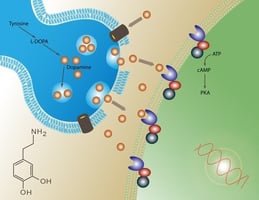Omega-3 Fatty Acid Brings Modest Improvement in ADHD
Children with attention-deficit/hyperactivity disorder (ADHD) may benefit from the addition of omega-3 fatty acid to their pharmacology regimen. It may also bring some improvement for children whose parents decline to have them take a pharmacological agent to treat ADHD. These findings come from a meta-analysis of omega-3 fatty acid supplementation reported in the August Journal of the American Academy of Child & Adolescent Psychiatry. Researchers Michael Bloch, M.D., and Ahmad Qawasmi, M.D., of the Yale Child Study Center evaluated 10 trials involving 699 children and found a "small but significant effect [for omega-3 fatty acid] in improving ADHD symptoms," but that beneficial effect fell short of that found for stimulants and other pharmacotherapies used to treat ADHD.
Read much more about the latest ADHD-related research and clinical findings in Psychiatric News at http://pn.psychiatryonline.org/content/46/15/24.2.full and http://pn.psychiatryonline.org/content/46/12/19.full. In-depth information about ADHD is also available in the American Psychiatric Publishing volume, ADHD Comorbidities: Handbook for ADHD Complications in Children and Adults. Information about this book is posted at www.appi.org/SearchCenter/Pages/SearchDetail.aspx?ItemId=62158.
Read much more about the latest ADHD-related research and clinical findings in Psychiatric News at http://pn.psychiatryonline.org/content/46/15/24.2.full and http://pn.psychiatryonline.org/content/46/12/19.full. In-depth information about ADHD is also available in the American Psychiatric Publishing volume, ADHD Comorbidities: Handbook for ADHD Complications in Children and Adults. Information about this book is posted at www.appi.org/SearchCenter/Pages/SearchDetail.aspx?ItemId=62158.
(Image: Shutterstock)






